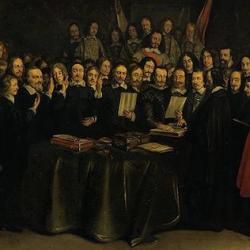Paul DeHart argues that Christianity, not the Enlightenment, gave us the separation of church and state.
He cites Gelasius. He points out that Christianity challenged the near-universal institution of sacral kingship on Christological grounds. He of course alludes to Jesus’ statement about the things of God and the things of Caesar. The separation of church and state didn’t privatize religion.
Thus: “Gelasius grounds the shattering of the ancient unity of government and sacred observances in the advent of the Messiah and the Incarnation. Only in the Messiah is authority over the two spheres joined. In human communities, these distinct realms are to be administered by different individuals. Those who administer civil government lack competence and jurisdiction in divine affairs. Those who administer the church are subordinate to civil rule in temporal affairs.”
Then he turns to the American founding, and his argument unravels a bit, though he doesn’t quite acknowledge it.
He places Madison firmly in the Gelasian tradition, though with this revealing qualification: “Gelasius envisioned a sphere of divine affairs governed by the church, while Madison has in view dictates of conscience apprehended by each individual. Yet, insofar as Madison preserves a sphere not subject to civil jurisdiction and over which God is sovereign, he stands in the Gelasian tradition rather than the modern tradition.”
Well, no. There’s all the difference in the world between the Gelasian affirmation of a churchly sphere independent of state control and individual freedom to follow the dictates of conscience.
Gelasius separated church and state without privatizing Christian faith. By the evidence DeHart himself presents, it’s not clear that Madison does the same. And between the two stands something that might plausibly come under the heading of “Enlightenment.”












